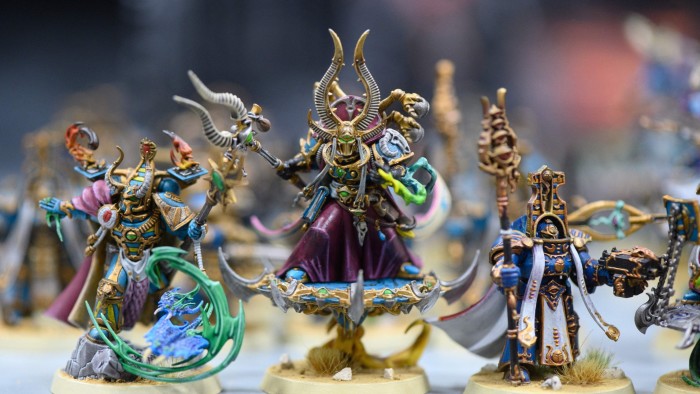Games Workshop, maker of the hit tabletop fantasy Warhammer, has battled its way to the gates of the FTSE 100 three decades after listing on the London stock market.
The company, whose hundreds of stores worldwide serve legions of fans of its complex games, is expected to replace value retailer B&M, Mike Ashley’s Frasers Group or homebuilder Vistry when the index’s latest reshuffle is announced on Wednesday.
Games Workshop’s elevation into the ranks of the 100 biggest UK-listed companies marks the culmination of a stunning rise in its shares, which are hovering around a record high that gives the group a market capitalisation of more than £4.6bn.
It is “one of the great British success stories”, said Russell Pointon of Edison Group, an investment research firm that counts Games Workshop as a client. “I spend a lot of time speaking to investors who are kind of kicking themselves [and asking] ‘have we missed it?’”
Entry into the FTSE 100 “will increase the profile of the business and bring it into focus for a wider investor base”, said Andrew Ford, an equity analyst at Peel Hunt, which is also the company’s corporate broker.
“We believe there is more to come. They’ve done incredibly well on the execution of the core business, it’s been very much growing underneath the surface without the profile of other intellectual property like Lord of The Rings and Marvel.”
The Nottingham-based company, which was among the “hobby stocks” that boomed during the pandemic as consumers spent more on their pastimes, has maintained growth since lockdowns ended. It said last month it expected pre-tax profit in the six months to December 1 to top £120mn, compared with £96.1mn a year earlier, on core revenues up roughly 10 per cent to more than £260mn.
In its most recent no-frills annual report — a document featuring plain black text on white paper where the only visual content is a handful of bar charts — recently departed chair John Brewis wrote: “Delivering results consistently over many years is truly exceptional and it isn’t easy . . . Avoiding distraction supports a laser focus on things which are in our control.”
The City is also expecting news this month on a tie-up with Amazon to create films and TV series based on the Warhammer 40,000 universe, after the two parties said they would agree “creative guidelines” by the end of this year for a project with the potential to expand the brand’s fan base. Superman star Henry Cavill, who has previously spoken about his enthusiasm for Warhammer, is expected to star in the productions.
“When lesser-known IPs hit the mainstream the profile does increase, although that may not necessarily drive sales through the core business,” said Ford at Peel Hunt. “When or if it does come, we don’t see it as a core driver, it could be an accelerator but there is a lot of potential in North America and in Asia for the core business without it.”
Games Workshop was founded in 1975 by friends John Peake, Steve Jackson and Ian Livingstone, who sold handmade wooden games from their homes in London. It grew as a mail-order business for fantasy games and opened its first store in 1978. The founders are no longer involved in the business.
The company’s big breakthrough came in 1983 when its designers came up with Warhammer, which is now the world’s most popular miniature war game. It has more than 500 shops worldwide and about 70 per cent of sales now come from outside of the UK.
Its games are a relatively costly pursuit, requiring steady outlays from dedicated players. A so-called complete combat patrol force of about a dozen space marines for its Warhammer 40,000 game costs £100 and a Cerberus heavy tank destroyer is £74. The plastic figurines and the rules of the games are constantly updated, leading to repeat purchases from its fan base.

Many hobbyists attend events at local clubs, schools and other venues, often organised by third parties. Some seasoned Warhammer aficionados even offer to paint the miniatures for cash as players may refuse to square up to their opponent without intricately painted figurines.
“It’s been driving growth through the depths of the lore that sits behind the game, the stories, the narrative, and its fan base,” said Ford. “The game is not just a financial investment for the fans but there’s an emotional investment, too — they put a lot of time into painting, reading and understanding the back stories of their armies and the Warhammer universe.”
Games Workshop designs, manufactures, distributes and sells its fantasy miniatures — it has two main factories, a paint factory, two warehouses, the Warhammer Studio and back office space in or near Nottingham.
The debt-free company, which aims to “distribute truly surplus cash to our shareholders”, has paid £428.8mn in dividends since 2021, according to Peel Hunt research. It has not had consistent success, however, with its shares crashing in 2007 after two profit warnings.
Increasingly, it makes money from licensing its intellectual property, such as the Space Marine video games, although returns can be tricky to model by the few analysts who cover the company.
“The company has relatively low costs in the licensing business and therefore, it’s profitable for them,” said Pointon at Edison Group, although he added that “the revenue is very lumpy”.
Jefferies has previously estimated that Games Workshop could earn $1mn per episode from its tie-up with Amazon based on a budget of $20mn-£30mn and assuming a 10-part series, plus higher fees and bonuses in follow-on seasons.
Source link









